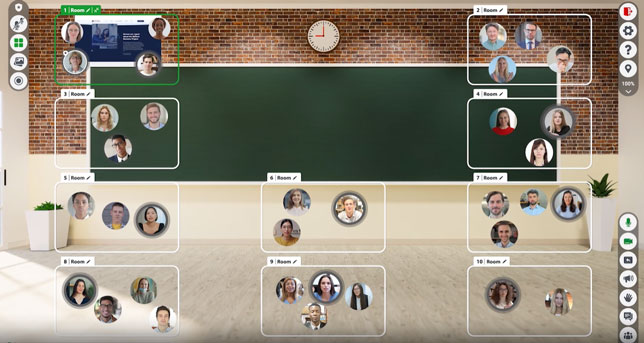Virtual Ed Platform Adds Integration with Canvas
- By Dian Schaffhauser
- 08/10/21

InSpace
InSpace, a new virtual education platform that allows students and instructors to interact online much like they would in physical spaces, has announced integration with Instructure's Canvas learning management system. The integration will allow students and faculty to use InSpace through the LMS without having to launch other applications.
InSpace, conceived by a Champlain College professor, lets participants move themselves — represented by video circles — around in a virtual space. For example, they can join a classroom or a group; they can hear and converse with others; and they can share screen contents.
The platform features:
- Videoconferencing for learning and socializing;
- Synchronous and asynchronous chat functions;
- Mobile notifications; and
- Virtual office hours for professors and administrators.
Along with the Canvas integration, the program is available as a mobile app and browser-based application.
"We have spoken with hundreds of fellow educators who were dissatisfied with the experience of teaching with videoconferencing platforms that were designed for business, not the classroom. They lacked human interactions and social cues necessary for learning," said CEO Narine Hall, an associate professor of data science and machine learning at Champlain, in a press release. "Educators overwhelmingly told us that they want better ways of connecting with their students by creating virtual communities with course study spaces and having virtual offices for professors and administrators. InSpace is a solution that complements teaching — it adds flexibility, without disrupting learning. Integrating with Canvas enables us to quickly bring these benefits to the largest group of educators and students."
InSpace has been picked up by educators in multiple colleges, including the University of California Berkeley, Massachusetts Institute of Technology and the University of San Francisco.
"InSpace made it possible for students to work closely together in small groups, and to collaborate with faculty on assignments," noted Allan Bower, a professor of engineering at Brown University. "Students have appreciated the additional flexibility of online meetings, and we plan to make these a permanent feature of the class."
Educators with Canvas accounts are being offered a free semester of Office Hours when they attend an online demonstration of InSpace.
About the Author
Dian Schaffhauser is a former senior contributing editor for 1105 Media's education publications THE Journal, Campus Technology and Spaces4Learning.